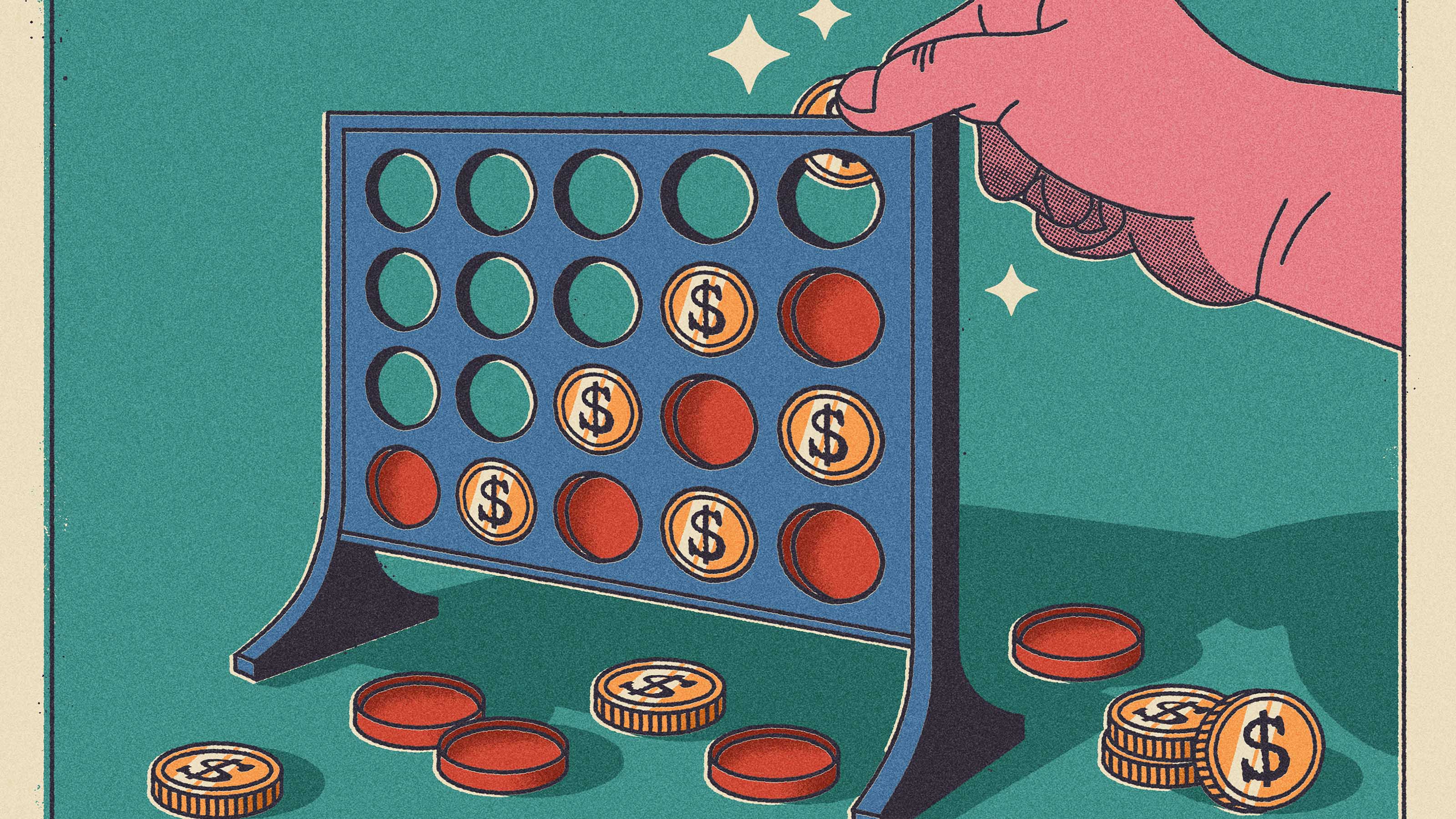I'll Beat the Market Yet
The aim of my venture into individual stocks is to prevail when the market plunges or languishes for years.

Profit and prosper with the best of Kiplinger's advice on investing, taxes, retirement, personal finance and much more. Delivered daily. Enter your email in the box and click Sign Me Up.
You are now subscribed
Your newsletter sign-up was successful
Want to add more newsletters?

Delivered daily
Kiplinger Today
Profit and prosper with the best of Kiplinger's advice on investing, taxes, retirement, personal finance and much more delivered daily. Smart money moves start here.

Sent five days a week
Kiplinger A Step Ahead
Get practical help to make better financial decisions in your everyday life, from spending to savings on top deals.

Delivered daily
Kiplinger Closing Bell
Get today's biggest financial and investing headlines delivered to your inbox every day the U.S. stock market is open.

Sent twice a week
Kiplinger Adviser Intel
Financial pros across the country share best practices and fresh tactics to preserve and grow your wealth.

Delivered weekly
Kiplinger Tax Tips
Trim your federal and state tax bills with practical tax-planning and tax-cutting strategies.

Sent twice a week
Kiplinger Retirement Tips
Your twice-a-week guide to planning and enjoying a financially secure and richly rewarding retirement

Sent bimonthly.
Kiplinger Adviser Angle
Insights for advisers, wealth managers and other financial professionals.

Sent twice a week
Kiplinger Investing Weekly
Your twice-a-week roundup of promising stocks, funds, companies and industries you should consider, ones you should avoid, and why.

Sent weekly for six weeks
Kiplinger Invest for Retirement
Your step-by-step six-part series on how to invest for retirement, from devising a successful strategy to exactly which investments to choose.
For a few glorious moments the other day, the total return since inception of my Practical Investing portfolio surpassed that of its benchmark, Vanguard Total Stock Market ETF (symbol VTI). However, a few days later, after a run of market gains, the index fund was back in front. And that’s the way it goes. The portfolio, which I launched in October 2011, typically lags on days when the market rises sharply and leads on days when the market stumbles.
This nip-and-tuck race spurred a reader to ask whether the portfolio had failed to live up to its goal of beating its benchmark over the long haul. “Would we all be better off simply investing in index funds?” the reader asked. The honest answer is that it’s too soon to say; we won’t know for sure until we experience a significant decline in share prices. And that hasn’t happened since I embarked on this project (see How to Survive a Stock Market Correction).
First, let me say up front that I like index funds. They’re a low-cost way to match the market. I’ll also confess that I don’t invest in individual stocks with the expectation that I’ll beat the market when stocks are charging ahead. When that’s happening, I’m pretty happy just to keep up.
From just $107.88 $24.99 for Kiplinger Personal Finance
Become a smarter, better informed investor. Subscribe from just $107.88 $24.99, plus get up to 4 Special Issues

Sign up for Kiplinger’s Free Newsletters
Profit and prosper with the best of expert advice on investing, taxes, retirement, personal finance and more - straight to your e-mail.
Profit and prosper with the best of expert advice - straight to your e-mail.
The real aim of my venture into individual stocks is to prevail when the market plunges or languishes for years. As wonderful as the Vanguard exchange-traded fund is at providing a broadly diversified basket of stocks, it falls short when it comes to controlling risk, as, frankly, most index funds do.
Index funds flunk Risk Management 101 for three reasons. First, index funds don’t hold cash. They buy all the securities in the index they track, and they remain fully invested at all times, whether stocks are cheap or expensive. I, on the other hand, hold more cash when stock prices look dear. Right now, I have about 7% of the portfolio’s assets in a money market fund.
Second, big companies tend to dominate broad-market index funds. That’s because traditional index funds are weighted by market capitalization. The bigger a company’s value on Wall Street, the bigger its share of the index. Thus, even though the Total Market fund owns 3,684 stocks, the five biggest holdings account for almost 9% of its assets. Overall, 72% of the ETF is invested in the shares of large companies, according to fund tracker Morningstar.
A better mix. Large companies are arguably more stable than small ones. But I think Total Market is too concentrated in big-cap stocks. My portfolio is more evenly divided among big, small and midsize enterprises.
Most important, my portfolio lets me be picky about the stocks I hold. That’s something index funds can’t do. An index fund must invest via formula. It can’t ask: Do I understand the business a particular company is in and the prospects for its industry? Do I like the firm’s leaders and the direction they’re taking? Do I believe the company is generating enough cash to keep paying its dividend and, better yet, boost it?
And the kicker: Are the shares simply too expensive for my taste? Some critics of index funds say that the traditional formula of weighting companies by market cap results in the funds becoming overloaded with stocks that have become overpriced. The more expensive an Apple or an ExxonMobil becomes, for example, the greater its market cap and the greater its weight in the index. I’m happy to say that the shares in my portfolio are a little less expensive than the shares in the index fund, and my stocks boast a better yield.
Will these risk-management steps protect the portfolio in a downturn or allow it to outperform the market when it stagnates? I hope so, but only time and a less exuberant market will tell.
Profit and prosper with the best of Kiplinger's advice on investing, taxes, retirement, personal finance and much more. Delivered daily. Enter your email in the box and click Sign Me Up.

-
 Over 65? Here's What the New $6K 'Senior Deduction' Means for Medicare IRMAA Costs
Over 65? Here's What the New $6K 'Senior Deduction' Means for Medicare IRMAA CostsTax Breaks A new deduction for people over age 65 has some thinking about Medicare premiums and MAGI strategy.
-
 U.S. Congress to End Emergency Tax Bill Over $6,000 Senior Deduction and Tip, Overtime Tax Breaks in D.C.
U.S. Congress to End Emergency Tax Bill Over $6,000 Senior Deduction and Tip, Overtime Tax Breaks in D.C.Tax Law Here's how taxpayers can amend their already-filed income tax returns amid a potentially looming legal battle on Capitol Hill.
-
 5 Investing Rules You Can Steal From Millennials
5 Investing Rules You Can Steal From MillennialsMillennials are reshaping the investing landscape. See how the tech-savvy generation is approaching capital markets – and the strategies you can take from them.
-
 The Most Tax-Friendly States for Investing in 2025 (Hint: There Are Two)
The Most Tax-Friendly States for Investing in 2025 (Hint: There Are Two)State Taxes Living in one of these places could lower your 2025 investment taxes — especially if you invest in real estate.
-
 The Final Countdown for Retirees with Investment Income
The Final Countdown for Retirees with Investment IncomeRetirement Tax Don’t assume Social Security withholding is enough. Some retirement income may require a quarterly estimated tax payment by the September 15 deadline.
-
 Vanguard Is 50! Here's How It Has Made Investing Better
Vanguard Is 50! Here's How It Has Made Investing BetterVanguard was established by John C. Bogle in May 1975, and the fund manager's impact on investing has been revolutionary.
-
 I Have $20,000 to Invest. What Should I Do?
I Have $20,000 to Invest. What Should I Do?We asked a financial expert to weigh in on where to invest $20,000.
-
 How to Master Index Investing
How to Master Index InvestingIndex investing allows market participants the ability to build their ideal portfolios using baskets of stocks and bonds. Here's how it works.
-
 16 Low-Cost ETFs to Buy
16 Low-Cost ETFs to BuyExpense ratios for index funds have declined in recent years, making them a cheap investing strategy to consider. Here are 16 low-cost ETFs to consider.
-
 How to Beef Up Your Portfolio Against Inflation
How to Beef Up Your Portfolio Against Inflationinvesting These sectors are better positioned to benefit from rising prices.
-
 Taxable or Tax-Deferred Account: How to Pick
Taxable or Tax-Deferred Account: How to PickInvesting for Income Use our guide to decide which assets belong in a taxable account and which go into a tax-advantaged account.